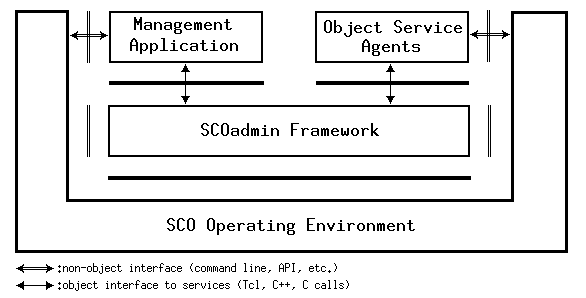
|
|
The SCOadmin framework provides support for networked object programming, error handling, internationalization, and registration of managers (to integrate them into the SCOadmin hierarchy). Its functions can be accessed from the /usr/lib/libsysadm.a library by C and C++ programs and directly from osavtcl for Tcl programs.
A SCOadmin manager has the capability to access managed objects on the local system or on any remote system using a backend known as an object service agent (OSA). Developers can create OSAs to define classes of objects (such as ``user''), their attributes (such as ``UID'', and the operations that can be performed on them (such as ``add''). A graphical OSA builder is available to help create all the necessary tables and functions as described in ``The OSA builder''.

The SCOadmin framework
When a manager performs an object operation, it makes an Object call to the framework with the name and class of the object, along with any other information needed for the object request. If the framework determines that the object request is for an object on another system, it forwards the request to the framework on the remote system. In either case, the framework determines the OSA associated with the requested object and passes the request to it. The OSA (which can be either a Tcl or C program) interprets the request and sends back a response, which is returned to the caller. The OSA/manager interface is based on the Open System Interconnect management protocol called Common Management Information Protocol (CMIP). SCOadmin uses a simplified version called Basic Management Information protocol (BMIP). The framework contains many helper functions to extract and manipulate BMIP information so that managers and OSAs do not have to deal directly with the protocol.